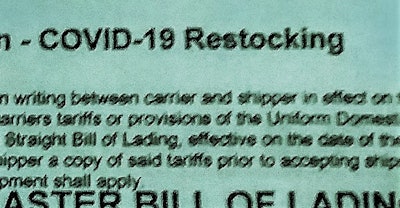
The Federal Motor Carrier Safety Administration has published a final rule narrowing the scope of regulatory relief granted to carriers automatically with declaration of an emergency. Applicable emergencies can be declared by a U.S president, state governor or the agency itself, and are defined in 49 Code of Federal Regulations 390.5 and 390.5(t). Presidentially-declared emergencies remain the same, creating a 30-day exemption from a wide swath of regs, 49 CFR parts 390 through 399. Yet other regs exemptions are now narrowed to half that time, and streamlined to automatically encompass just the hours of service drive-time limits.
Based on FMCSA reps' subject matter expertise and input from states, affected localities, industry groups, and others, FMCSA contends most emergencies justify allowing carriers and drivers relief from the normal HOS limits. Yet other requirements related to, for instance, driver qualifications, vehicle inspections, and parts and accessories should remain in place. Those regs "often have no direct bearing on the motor carrier’s ability to provide direct assistance to the emergency relief effort," FMCSA said with announcement of the final rule.
Originally, the agency envisioned limiting the amount of time for automatic relief to just five days in most instances. With the final rule, the agency cited concerns over increased frequency and severity of weather-related disasters nationwide with climate change as justification for regional relief timelines longer than initially proposed.
The move to narrow the scope of automatic regs relief followed the December 2022 NPRM, issued two months after the agency allowed the unprecedented COVID-19 emergency waiver from HOS limits to expire. The national COVID-related emergency declaration had been in place for well over two years, and was extended and modified numerous times before allowed to expire Oct. 15, 2022.
[Related: Owner-ops, groups: COVID hours waiver should open the door for more hours of service flexibility]
The new rule revises the regulation that governs emergency regulatory relief -- 49 CFR 390.23 -- in several ways, the agency said. While Presidential declarations of emergency will continue to trigger a 30-day exemption from all regs in parts 390 through 399, the rule newly limits the duration and scope of the automatic relief that takes effect upon a regional declaration by a governor, a governor’s authorized representative, or FMCSA itself.
The changes limit state- or agency-directed relief to just 14 days, as opposed to 30 days, and exempt commercial drivers only from the max-drive-time HOS regulations in parts 395.3 and 395.5, as opposed to all regulations in parts 390 through 399.
Commenters on the original NPRM expressed concern that a proposed, very-short 5-day emergency exemption period would be too short to provide emergency relief, and also too little time for FMCSA to receive and evaluate information on whether a longer emergency exemption was warranted.
While FMCSA feels most emergency declarations should expire within 5 days, the agency noted it was well "aware that climate change has impacted both the number and severity of storms that often give rise to regional declarations of emergency," the agency said. "Providing for 14 days of automatic relief will allow emergency relief efforts in these severe weather scenarios to continue unabated, without fear that there will be a lapse between the automatic regulatory relief and any FMCSA action to extend or reinstate the regulatory relief."
For emergencies that do not require an extended response, a governor-issued emergency declaration will end upon cessation of the emergency declaration or 14 days, whichever is sooner.
Governor-declared states of emergency due to a shortage of residential heating fuel still require a 30-day relief period from 40 CFR 390 through 399, a statutory requirement from the Reliable Home Heating Act (49 U.S.C. 31136).
For local emergencies under section 390.23(c), the automatic regulatory relief is limited to five days, which had been the case already.
Finally, the rule simplified regs language allowing FMCSA to extend and modify automatic regulatory relief, either on its own volition or upon request. All requests for modifications and extensions must be made via email. FMCSA will still establish a time limit for the extended or modified emergency exemption, and the Agency may place any restrictions upon the emergency relief. This final rule adds, specifically, that FMCSA may include reporting requirements as one of these restrictions.
FMCSA added it is requesting approval from the White House Office of Management and Budget for collection of information as part of this rulemaking to help the agency determine ongoing need for any extended emergency regs waiver.
[Related: Speed limiters at 68 mph 'still speculation,' but truckers hate it anyway]









